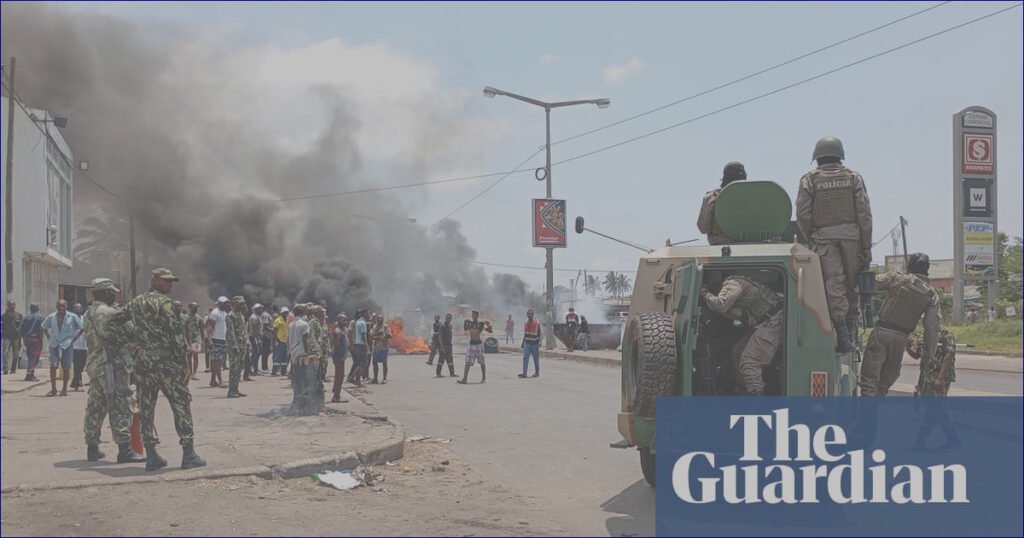Mozambique teeters on the brink of upheaval as it anticipates a critical ruling on Monday that will unveil the contentious outcomes of October’s fraught elections. Allegations of electoral malfeasance have ignited weeks of relentless protests, during which security forces have reportedly taken the lives of numerous demonstrators.
In a bold declaration, opposition presidential contender Venâncio Mondlane has ominously warned of impending “chaos” should the constitutional council endorse the preliminary election results—results that astonishingly appointed the ruling party candidate, Daniel Chapo, with a staggering 70.7% of the votes, leaving Mondlane with a mere 20.3%.
The Podemos party, allied with Mondlane, vehemently contests the seat allocation, asserting it ought to have seized 138 out of 250 parliamentary seats, not the paltry 31 decreed by the election commission.
Allegations of ballot manipulation have surfaced, with Mozambique’s Catholic bishops denouncing instances of ballot-stuffing. Meanwhile, European Union election monitors have flagged “irregularities during counting and unjustified alterations of the electoral results.”
Mondlane has persistently claimed victory and exhorted his supporters to flood the streets. This surge in unrest has ground the economy nearly to a halt, disrupting trade with neighboring South Africa and shuttering borders.
In stark response to the protests, security forces have unleashed a brutal crackdown, resulting in at least 130 fatalities and hundreds of injuries, as reported by Human Rights Watch. Local reports chronicled a tragic incident where security personnel shot two mourners during a funeral for Mano Shottas, a blogger killed while livestreaming a protest just days prior.
Violence has begun to mar the landscape, with fires consuming the offices of the ruling Frelimo party and a statue of the former defence minister Alberto Chipande—deemed a pivotal figure in Mozambique’s fight for independence—toppled.
“This Monday, the entire nation must ground to a halt,” Mondlane declared during a recent broadcast streamed on Facebook from an undisclosed location abroad, where he claims he has taken refuge to evade assassination attempts.
He called for a day of prayer for the judges of the constitutional council, emphasizing, “We are praying so that justice prevails, and electoral truth emerges untainted by falsehoods.”
Outgoing president Filipe Nyusi refuted Mondlane’s insinuations of an intended power grab, assuring on Thursday that he would vacate office as planned come January.
In an implicit critique of Mondlane’s rhetoric, Nyusi lamented, “It troubles us that the process of electing our leaders has become a pretext for escalating social tensions and instigating violence.”
Zenaida Machado from Human Rights Watch noted the administration’s tactics aimed at framing the protest movement as violent to justify its excessive force. “It is crucial to understand that individuals within a protest may act violently, but this does not cast a shadow over the entire movement,” she emphasized.
As the countdown to the ruling narrows, analysts speculate on the electoral integrity, with many acknowledging a certain degree of rigging, yet the question of Mondlane’s true victory remains murky at best.
“A 70% majority for Frelimo blindsided everyone,” remarked Alex Vines from the Commonwealth’s observation team. “Yet we cannot definitively claim that Mondlane emerged victorious; the truth simply isn’t known.”
Vines underscored that the Renamo party’s vote had diminished significantly in its core territories, benefiting Frelimo, while Podemos and Mondlane found their support in urban regions—a scenario insufficient to clinch a majority.
It’s noteworthy that four of the constitutional council’s seven judges hail from Frelimo appointments, with the chairperson selected by Nyusi himself.
Adriano Nuvunga, head of the Centre for Democracy and Human Rights, encapsulated the prevailing anxiety: “The outcome hinges on their announcement—will they affirm the current results with mere adjustments or enact a pivotal change? We are, undoubtedly, bracing for the impact.”

